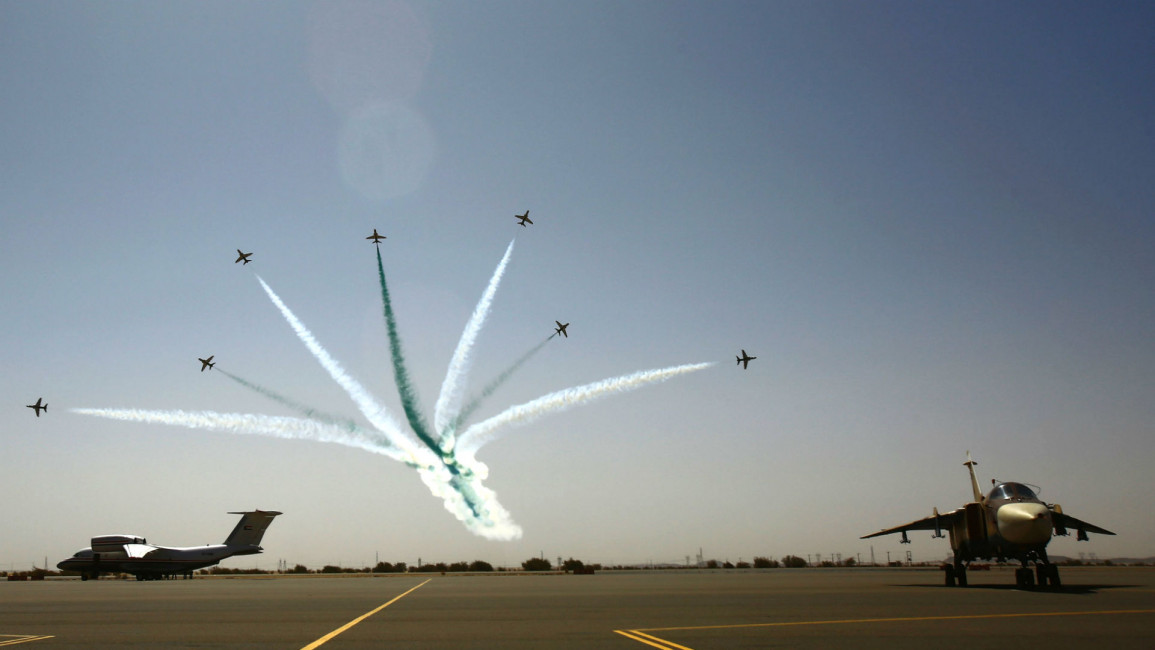British weapons manufacturer refuses to confirm arming Saudi jets
He also did not answer whether the firm had approached the Royal Saudi Air Force to retrofit the British-made Typhoon and Tornado jets, thus preventing them from dropping cluster bombs. Cluster munitions are illegal in 119 states, including the UK, due to the indiscriminate damage they cause.
Saudi Arabia has admitted to using British-manufactured cluster bombs in December 2016, and pledged it would not happen again. However it reportedly continues to use cluster bombs made in the US and Brazil - countries which are not parties to the Convention on Cluster Munitions.
Carr dodged the questions asked by activists at the annual general meeting of the company on Wednesday 10 May in Farnborough, Middlesex.
The meeting opened with remarks by the chair and the group's executive director, Ian King, describing 2016 as a "successful and pivotal year", characterised by "geopolitical uncertainty, terrorism and heightened tensions", leading to increased earnings for BAE and its shareholders.
The meeting was disrupted by members of the Campaign Against the Arms Trade (CAAT), who had bought shares in the company, enabling them to ask questions and raise fellow shareholders' attention over the company's exports to Saudi Arabia.
In March 2015, a Saudi-led coalition of nine Arab states armed by the US and UK began bombing Yemen.
More than 10,000 people have lost their lives in the conflict to date. Saudi Arabia is responsible for two-thirds of the deaths, according to the UN.
In December 2015, UK-granted exports licences to Saudi Arabia exceeded £1.7 billion ($2.2bn) in value for combat aircraft, and more than £1 billion ($1.3bn) for air-delivered bombs.
 |
|
| BAE's Roger Carr said Saudi Arabia was 'not an aggressor' in the war in Yemen [Getty] |
BAE calls Saudi Arabia a "key market". It has already provided 72 fighter jets, training and support to the Royal Saudi Air Force through a government-to-government contract.
In July 2016 the company signed a £2.1bn ($2.7bn) contract to provide 10 years of support for Typhoon jets, and it is negotiating the sale of a further 48 jets to Riyadh.
BAE employs 6,200 staff in Saudi Arabia. In one job advertisement on BAE's website, the company was looking for a "weapons load technician" based in Dharan to "accomplish sage reliable loading of munitions on Tornado aircraft", "maintain aircraft weapon systems", and to "arm, de-arm".
Dharan is home to a Royal Saudi Air Force Base, where fighter jets take off to drop bombs on Yemen.
Activists asked whether the company was responsible for arming these jets, as the job description suggests. But BAE chairman refused to reply, affirming he "would not know".
He also claimed that "Saudi Arabia is not an aggressor in this conflict but a defender", that "the company does not take part in military operations", and scolded the activists for their "prejudiced views".
He later said that "war is terrible thing and terrible things happen in war", but "what we do is ethically sound and correct and safeguards us all".
He also said that the UK and its allies should "speak softly but carry a big stick" - and BAE's job was to "provide that stick".
The British government is undergoing a judicial review on the legality of its arms exports to Saudi Arabia. The case, currently being held in the High Court, was brought by CAAT and other human rights groups, based on evidence of violations of international humanitarian law by the Saudi-led coalition.
The Arms Trade Treaty, of which the UK was one of the first signatories and a strong promoter, bans states from allowing arms exports in situations which could could lead to human rights violations and breaches of international humanitarian law.
Roger Carr refused to discuss evidence of human rights violations by Saudi Arabia, suggesting that the deeply conservative kingdom is on its way to liberalisation "at the pace which it can afford".
He said the AGM was "not a court of human rights", arguing that "at the end of the day we are a defence and security company, the government makes the decisions", but that he would make "no apology" for the company's actions.



